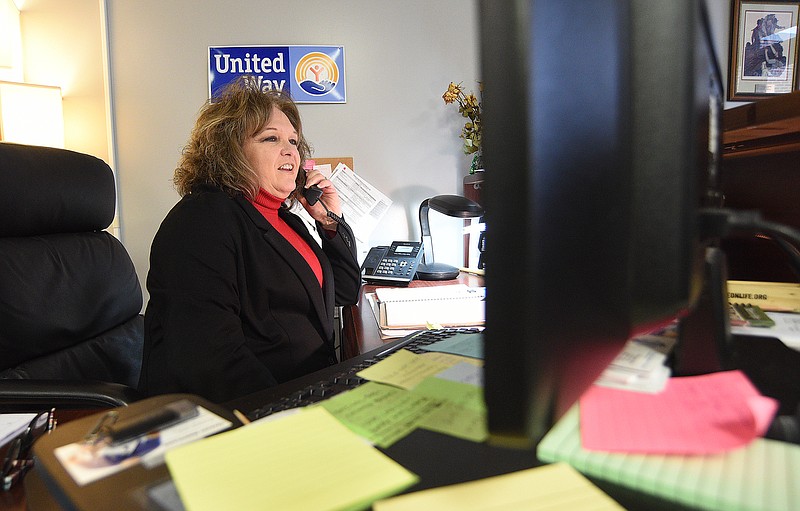We all need help sometimes. Because life is good at throwing curveballs. Especially this year and last.
As journalists, we see it a lot - life-wrecking curveballs tossed at people in the form of COVID-19 or other life-threatening illnesses, lost jobs, fires, auto accidents, tornadoes, floods and other family tragedies. But we also see people's profound goodness and empathy. We see our community's strength when confronted with adversity.
That's why, as a newspaper, we've continued for more than a century to sponsor the Neediest Cases Fund. It is our way and your way of paying it forward to help ordinary people - our neighbors - who fall on hard times once in a while.
Ordinary people like past Olympic gold medalist Venus Lacy, the 6-foot-4 star who once led her Brainerd High School basketball team to the 1983-84 state championship, then with another team won a national championship at Louisiana Tech University and then in 1996, with her U.S. basketball teammates, won Olympic gold in Atlanta. But in 1997, one of life's curveballs found her. She suffered a traumatic brain injury in an automobile accident and for years after was affected by memory loss and depression.
In April, her monthly Social Security disability payments were cut nearly in half when her son turned 18. Soon she was more than two months behind on her rent and couldn't pay her car insurance.
"I was on the verge of getting put out" of her home, she told the Chattanooga Times Free Press.
But in September she started a new job with Keithcare Inc. working with disabled adults. And help came from the Neediest Cases fund to get her current again.
Ordinary people like Kris Lewis, a Dayton father of two, whose outdoor painting job was sidelined earlier this year by the COVID-19 slowdown. After a few months he landed a new job at Dayton's La-Z-Boy furniture plant, but he still needed help catching up on his back rent to keep a roof over his daughters' heads.
Last year, it was an ordinary mom like Jasmine Fuller who lost both her fiance and their Wilcox Boulevard rental home when the same storms that brought us an Easter 2020 tornado threw a tree into their bedroom, killing her fiance instantly. Fuller already had lost her job during the COVID shutdown and now, with her fiance gone, she and the children had no income. She soon found work, but not before getting behind financially.
In years before that, the Neediest Cases Fund helped a veteran, his wife and two special-needs children, who were facing what seemed an insurmountable hurdle to pay for a $3,300 car repair while the dad juggled work and other day-to-day bills.
In 2016, 40 Rhea County workers lost their jobs when Fuji Film and Goodman Manufacturing began planning to close up shop. They, too, received help paying their utility bills and rent.
All this kindness and help came thanks to you. Not us. You, readers, helped your neighbors. All we did, really, was tell you about them, and you did the rest.
The idea for the Times Neediest Cases Fund was born on Christmas Day 1911 in New York, when Adolph S. Ochs, then-publisher of The New York Times and The Chattanooga Times, went out for a walk after a big turkey dinner. On the walk, he encountered a shabbily dressed man on the street who told him he had just been given Christmas dinner at a Y.M.C.A. but had nowhere to sleep.
Ochs looked him over, decided he looked respectable, gave him a few dollars and his card.
"If you're looking for a job," he said, "come see me tomorrow."
The encounter made Ochs feel good, and he began thinking about charity and wondering if one man's feeling might be the basis for a city's goodwill, according to an online history of the New York fund - the forerunner of the Chattanooga Neediest Cases Fund.
The following holiday season, Ochs decided to publish articles about the Hundred Neediest Cases in New York, and make an appeal for help not with a direct request for money, but with the facts of those neediest lives. That first year, the campaign lasted nine days and collected $3,630.88 (about $100,000 in today's dollars) from 117 contributors. This year it also continues in New York and has raised more than $320 million.
Here, at home, the Chattanooga Times' Neediest Cases Fund was launched in 1914.
The Chattanooga Times - and later the Chattanooga Times Free Press - have been raising money to help locally for the 107 years since, running stories twice a week from Thanksgiving until the end of December.
Recipients are required to be employed to receive assistance from the fund, which fulfills basic needs such as housing, utilities and food to those who need one-time help to become self-sufficient.
We hope you'll help again this year. Your donations (and ours) are collected online through the United Way or by mailing a gift slip that may be found with our Neediest Cases stories in the newspaper. Contributions are accepted through Dec. 31 and are acknowledged in the newspaper.
On Sunday, the local fund stood at just over $52,310. Last year, the appeal raised nearly $80,000 for Chattanooga residents, making it one of most successful years ever and nearly doubling a typical campaign year.
We thank you. And your neighbors thank you.
